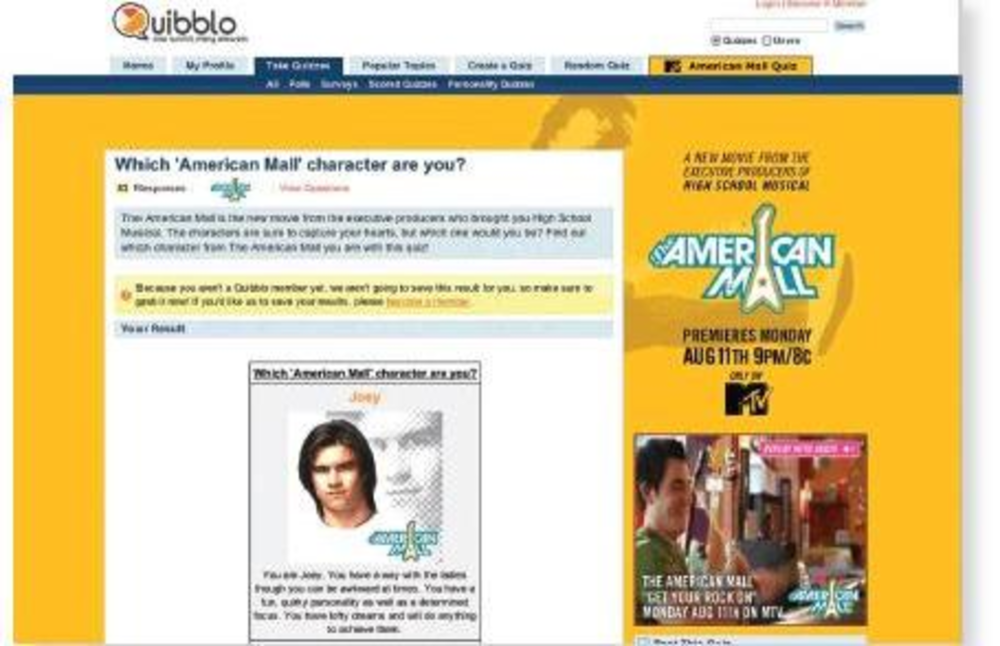For marketers trying to reach teenagers, just sending a simple message out to the masses, or even to a targeted group, is no longer enough. Young, media-savvy and media-saturated consumers are demanding personal engagement from advertisers — on their own terms.
“What teens really demand is engagement,” says Seth Lieberman, CEO of Pangea Media, a company that runs quiz Web sites. “They fundamentally expect to be involved in and interact with brands directly.”
Social sites represent a huge component in the battle to win teenage eyeballs. The speed of information exchange, the feeling of community and the viral aspect of widgets, quizzes, contests and videos perfectly position these media to seen by teens and sent out to their social spheres.
“Any type of brand needs a presence in social media,” says Jennifer Johnston, SVP of brand marketing for NexCen Franchise Management, the parent company of Pretzelmaker/Pretzel Time. “Teens are spending most of their time on the Internet; it’s where you [keep teens’ attention] and get them to interact with the brand.”
To fit into the rhythm of a teen’s fast-paced, multimedia life, these interactions must happen quickly — if possible, in real time. Now, brands must keep pace with the rate at which teens cycle through media messages. Something that slides easily into their consumption habits has a much better chance of making a good, lasting impression on them. Smart marketers are creating messages that can be viewed, commented on, linked to, sent to friends and adopted in other ways as quickly as teens can discover them.
“Teens expect to interact, comment and get results right away,” Lieberman elaborated. “There is an increased expectation that brands engage them and listen to them.”
However, it takes more than just a request for comment to get teens actively participating with a brand. Whatever a marketer is asking teens to look up, download or add to their MySpace page has to appeal to them on a more personal level — either by tying to content that they already like, supporting a cause that is near and dear to their hearts, or offering something that reflects their personality.
“When teens are putting content on their pages in social networks or on personal Web pages, it’s all about self-expression,” said Liza Hausman, VP of marketing and analytics for widget company Gigya, which offered teens a widget that counted down to the release of limited-edition Levi’s jeans and Air Jordan shoes. “They want to look cool and increase their social capital because that’s where their friends are going to check them out, so they will not put something there that doesn’t reflect their point of view.”
These young consumers demand that brands converse with them in much the same way that their friends do — in their language, through multiple channels, and with the intention of actually listening. Marketers must be prepared and willing to react to what teens are saying about their brands, or risk negative, virally spread backlash from disenchanted customers.
“In this market, there are no longer traditional brand managers,” Johnston noted. “Our consumers are brand mangers. We can create guidelines around a brand, but it’s really a consumer-generated market right now.”
Campaigns
MTV Networks
Quiz site
To build buzz for its upcoming TV movie, American Mall, MTV Networks looked to Pangea Media and its teen-friendly quiz site, Quibblo.com. The week before the movie aired, Quibblo ran a MTV American Mall navigation tab that drove users to a “Which American Mall Character Are You?” personality quiz. Quiz-takers received a badge that showed which character they were like, which they could then post to social sites’ profiles. More than 2,500 people took the quiz, and users created another 130 American Mall quizzes in response.
Pretzelmaker
Viral campaign
In June, Pretzelmaker launched “The Pretzel Dogs Kick Bun Video Challenge,” aimed at teens. The three-month viral campaign, which ended September 9, asked customers to upload videos showing the superiority of the Pretzel Dog over the traditional hot dog. The maker of the best video will receive $5,000. Pretzelmaker franchisees have reported increases in Pretzel Dog sales of 100% to 200% over last summer’s numbers.
Levi’s
Branded widget
Three weeks before releasing a limited edition run of co-branded Levi’s 501 jeans and Nike Air Jordan sneakers, Levi’s posted a branded widget on targeted sneaker sites. The widget offered photos of the product, three unreleased hip-hop tracks, a link to all the store locations that were selling the products and a timer that counted down to the release date. Each widget drove 10 product views, on average, and all 3,000 units of the product sold out within 50 seconds of its release.








